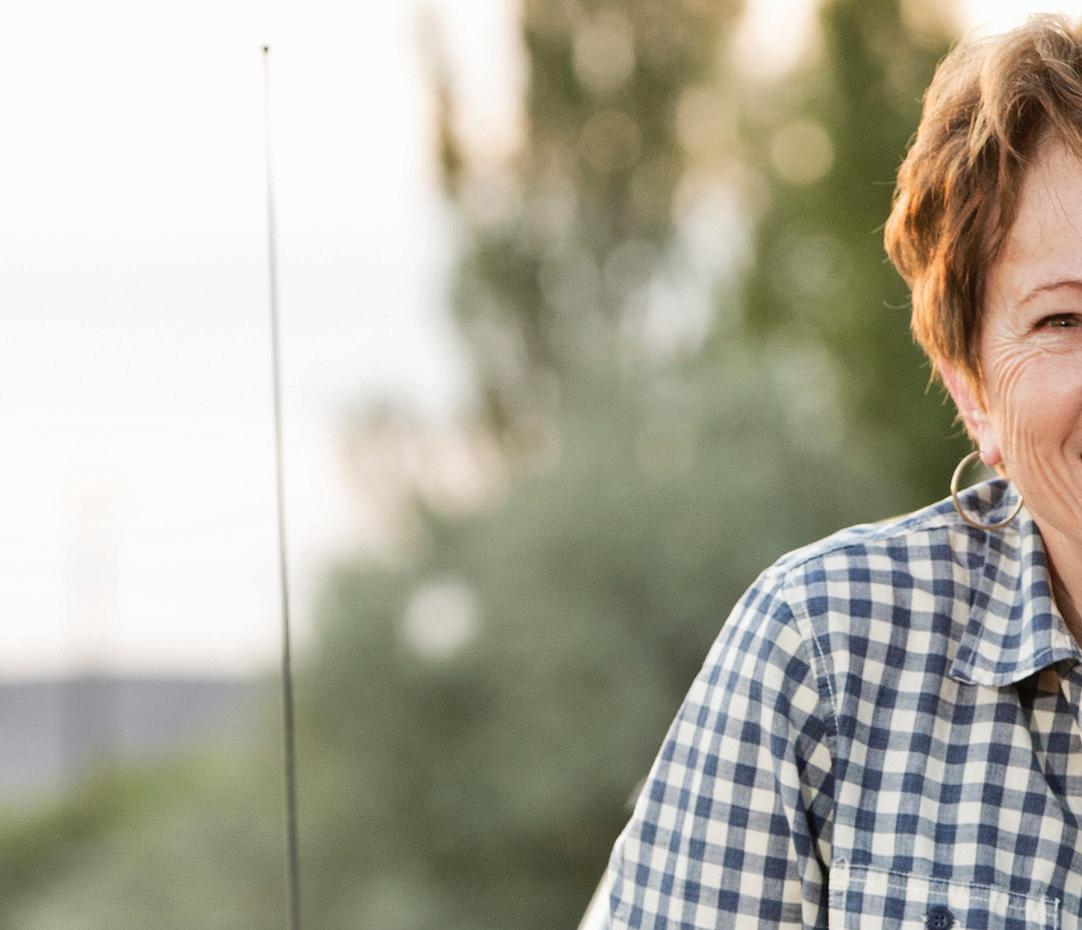Senior Living
PLANNING FOR LIFE AFTER 50
With informative features on health and wellness, retirement living and more!

Saturday, February 25, 2023


PLANNING FOR LIFE AFTER 50
With informative features on health and wellness, retirement living and more!

Saturday, February 25, 2023


The human body is a marvel. How the body transforms over the course of an individual’s life is one of its more remarkable qualities, and those changes never cease, even as individuals near retirement age. The changes associated with aging include physical transformations but also more subtle shifts the naked eye cannot see. For example, metabolism slows as individuals grow older, and aging also can lead to a decrease in bone density and muscle mass. These changes affect how men and women at or nearing retirement age should approach their diets in recognition of the various ways their nutritional needs change at this point in their lives. Any modifications to a diet should first be discussed with a physician, but the following are some ways aging adults can use diet to combat age-related changes to their bodies.

• Prioritize protein. The authors of a 2010 study published in the journal Current Opinion in Nutrition and Metabolic Care recommended that older adults consume between 25 and 30 grams of protein with each meal. The researchers behind the study concluded that such consumption could limit inactivity-mediated losses of muscle mass and function.

• Overcome reduced production of vitamin D. WebMD notes that people over 65 typically experience a decrease in natural production of vitamin D. Vitamin D is not naturally found in many foods, so aging men and women may need to rely on supplementation to ensure their bodies get enough of it. Vitamin D helps with anti-inflammation, immune system support and muscle function, among other benefits.

• Consume ample dietary fiber. The National Resource Center on Nutrition & Aging notes that fiber plays an important role in the health of older adults. Fiber has been linked with heart health, healthy digestion, feeling full, and preventing constipation. Though the NRCNA notes that older adults need slightly less fiber than their younger counterparts, it’s still a
• Monitor intake of vitamin B12. The NRCNA notes that vitamin B12 is involved in a host of important functions in the body, including nerve function and the formation of red blood cells. Vitamin B12 is most easily found in animal products, which many aging men and women must largely avoid due to other health concerns. In such instances, men and women can discuss supplementation with their physicians as well as alternative food sources of B12, such as fortified cereals, salmon and other items.

Bodily changes related to aging increase the likelihood that men and women will need to alter their diets in order to maintain their health.


vital component of a nutritious diet. The feeling of fullness that fiber consumption can provide also is significant, as it can ensure adults who aren’t burning as many calories as they used to aren’t overeating in order to feel satisfied.

Board-certified cardiologist Dr. Mary Menz with Morris Hospital Cardiovascular Specialists encourages women to think about their hearts. While it should come as no surprise that cardiovascular disease is the No. 1 killer of both men and women in the United States, Dr. Menz says only one-half of women are aware of this risk.
In recognition of American Heart Month, Dr. Menz shared her insights into what women need to know when it comes to heart disease and what steps they should take now to prevent it.
Q: Why is it important for women to take their heart health seriously?
Dr. Menz: Heart disease remains the No. 1 killer of both men and women in this country. Even though we’ve had the spotlight on cardiovascular disease for years, still, only about half of women realize that heart disease is their No. 1 risk for death.
Q: In general, we’ve learned that prevention is the best approach to cardiovascular disease. What can we do to prevent heart disease?
Dr. Menz: I always tell patients the best thing they can do to prevent heart disease is to just have knowledge. Knowledge is definitely power. You need to know your numbers. You need to know what your blood pressure runs, and whether or not you have high blood pressure. You need to know what your cholesterol is, and whether or not you have normal cholesterol or abnormal cholesterol readings. You need to know what your blood sugar is, and whether or not you have diabetes. Those are the three most important risk factors for heart disease. Of course, if you’re a smoker, you need to know that you should quit. Knowing your numbers and talking to your doctor about ways to get any abnormal readings under control are extremely important in preventing future heart disease. Ultimately, it’s easier to prevent heart disease than it is to treat it once you have it.
Q: How serious of a problem is heart disease in women?
Dr. Menz: Heart disease is the No. 1 killer of women in this country. In 2019, according to the Centers for Disease Control, heart disease accounted for 301,000 deaths in this country, which is 1 in every 5 deaths in women. That means 20 percent of all deaths in women in this country are caused by cardiovascular disease. That’s a huge number.
Q: Are signs and symptoms of heart issues in women different than they are in men?
Dr. Menz: Many of the signs and symptoms are the same in women as in men. Obviously women can have chest pain or pain that radiates into their back, jaw or neck. But the most common presenting symptom for heart disease in women is actually overwhelming fatigue. That fatigue predates overt symptoms of chest pain or shortness of breath by often weeks to months. It’s not just your usual tired because most of us are tired. We have jobs, we have families and we have things we take care of. I’m talking about having to sit down and rest after doing a load of laundry because you are just exhausted. Or it can be getting through the work day, but by the time you get home you can’t do anything else because you’re so tired. If you’re experiencing that kind of fatigue, it is something you should take seriously and see your doctor because it can be a sign that you’ve
Continued on next page
O ttawa Campus
1306 Gemini Circle, O ttawa 815-433-9200
Family Medicine: Dr. Hassnain Syed Dr. Je rey Tanzi
Ashley Blough, F.N.P.-B.C.
Angela Todd, F.N.P.-B.C.
Pediatrics: Dr. Melissa Hill
Marseilles Healthcare Center
580 Sycamore St., Marseilles 815-795-2122
Pediatrics: Dr. Ian Best Newark Healthcare Center
Family Medicine: Ashley Blough, F.N.P.-B.C.
5 N. Johnson, Newark 815-695-5042
Family Medicine: Jennifer Frye, F.N.P.-B.C.

Seneca Healthcare Center
271 N. Main St., Seneca 815-357-8511
Family Medicine:
Dr. Colin K ao Nina Seplak , F.N.P.-B.C.
Cardiovascular Specialists
1300 Star re Dr., Ottawa
815-705-1000
Cardiologists:
Dr. Syed Ahmed
Dr. Mar y Menz
Dr. Athar Saeed
Obstetrics & Gynecology Specialists
1300 Star re Dr., Ottawa
815-324-9700
OB/GYNs:
Dr Victoria Ochoa
Dr. Douglas Toussaint
Orthopedics & Sports Medicine
1306 Gemini Circle, Ottawa
815-324-9700
Orthopedic Surgeon:
Dr. Raymond Meyer
Dr. Keith Rezin
Dr. Robert Williams
Foot & Ankle Surgeon:
Dr. Kyle Pearson
Orthopedic
Spine Surgeon:
Dr. Mir Ali
Physical Therapy
Occupational Therapy
developed cardiovascular disease. Shortness of breath is also common, especially with your normal daily activities. Assuming your laundry is in the basement and you go up and down the stairs to do laundry, and now all of a sudden you’re finding you have to work a little hard to do that, that’s an important warning sign.





Dr. Menz: The best thing to do is work with your doctor to manage any risk factors that you have. As I mentioned before, managing blood pressure, diabetes, cholesterol levels and stress levels can be very important. You have to find healthy ways to cope with stress. Getting regular physical activity is extremely important. It’s something I can’t emphasize enough. I am a reformed couch potato, and now I exercise every single day. If you had told me a year ago that I would run three miles before work every day, I would have laughed. Since I’ve started doing it, I can’t begin to tell you how much better I feel. So getting that physical activity is hugely important. We really like people to get at least 2 hours and 30 minutes a week, which is 150 minutes. That’s just 22 minutes a day. You can do anything for just 22 minutes a day. Exercise is very important. Of course, our diet is extremely important, too. It’s important to choose healthy food and beverages and try to avoid extremely processed foods or things that have a lot of chemicals in them. Try to eat a diet that is more geared towards vegetables and fresh foods than meats. You don’t have to go completely vegan or vegetarian, but having a more plant-based diet definitely does decrease your risk for heart disease.

Q: So you’re talking about more than just eating your fruits and veggies?
Dr. Menz: It is beyond that. We’re in the Midwest, so it’s a hard thing to do, but make a choice to at least have your plate geared more towards vegetables and fruits while limiting the amount of meat that you eat. We know that red meat is bad for us, so it’s really important to limit red meat
to even just once a month and try to choose fish whenever you can. Fish is one healthier option if you’re looking at continuing to maintain some sort of animal protein in your diet. The more plant based you get, the healthier your diet and the better it is for your cholesterol.
Q: Where do I start?

Dr. Menz: You can start by getting your blood pressure checked and having a blood test to check your cholesterol and glucose. Those are really important, simple things to do. And it just take a few minutes. Even if it means walking into a pharmacy and using an automated blood pressure cuff to see your blood pressure reading, that’s a good start and a step in the right direction.
Dr. Mary Menz is a board-certified cardiologist with Morris Hospital Cardiovascular Specialists. Along with Dr. Menz, the practice includes Dr. Syed Ahmed, Dr. Athar Saeed, and Nurse Practitioner Sherese Pruss, with office locations in Ottawa, Morris, Channahon and Dwight. To schedule an appointment, call 815-705-1000.
Cognitive health is not something to take for granted. Although a certain level of memory loss can be expected as people age, when the ability to clearly think, learn and remember is compromised, those changes can affect an individual’s ability to perform daily activities and should serve as a cause for concern.

Brain health should be a priority for everyone. The National Institute on Aging says brain health is an umbrella term that encompasses a host of factors, including:


• cognitive health, which is how well you think, learn and remember
• motor function, or how you make and control movements
• tactile function, which is how you feel sensations; and

• emotional function, or how emotions are interpreted and responded to.
Individuals can safeguard brain health — particularly cognitive health — by taking these steps.
Working with doctors, individuals can put their health first. This includes getting routine screenings, managing chronic health problems, limiting or avoiding alcohol and nicotine products, and getting the recommended amount of sleep each night.


All chronic conditions cause long-term repercussions, but the NIA indicates that observational studies show having high blood pressure in mid-life increases the risk of cognitive decline later in life. Lowering blood pressure lowers the risk for mild cognitive impairment and possibly dementia.
Harvard Medical School says nurturing social contacts, engaging in stimulating mental activities like reading and doing puzzles, seeing new places, and learning new things can help keep the brain in top form.


Stress can take its toll on the body, and there is reason to believe that it may adversely affect cognitive health as well. Make every stride to reduce stress, whether that involves taking vacations, meditating, laughing with friends and family, or engaging in relaxing activities that relieve stress.
Get enough vitamin D

Vitamin D is linked to a host health benefits, including its potential to promote a healthy brain. Individuals can get more time outdoors to get vitamin D naturally from the sun and eat foods rich in vitamin D. If doctors find that vitamin D levels are exceptionally low, supplementation can help.
Certain hearing loss has been linked to cognitive decline, says Healthline. Researchers in Italy concluded that people with central hearing loss had a higher risk of mild cognitive impairment than those with no hearing loss or peripheral hearing loss. Individuals with central hearing loss are urged to speak to their physicians to determine if they can take preventive action to stave off further decline.
Cognitive health should be a priority. Adults can employ various strategies to reduce their risk of cognitive decline as they age. seniorfriendly.



What constitutes a perfect retirement is different for everyone. Some people may imagine spending their golden years fishing their days away, while others may aspire to finally embrace their inner globetrotter. Though individuals’ retirement dreams differ, every retiree will need money, which only underscores the importance of a wise and disciplined approach to money management.
Average life expectancies have risen considerably over the last several decades. According to estimates from the United Nations Population Division, the average life expectancy in Canada for both sexes is just under 83 years, while it’s slightly more than 79 in the United States. Those figures are a welcome sign, but they may inspire a little fear among seniors who are concerned that they might outlive their money. No one knows how long they will live, but everyone can embrace a handful of money management strategies to increase the chances that they won’t feel a financial pinch in retirement.
• Study up on the tax implications of withdrawing from your retirement accounts. Every retirement investment vehicle, whether it’s an IRA or a 401(k), has tax implications. Money withdrawn too early may incur tax penalties, and even money withdrawn long past retirement age could elevate retirees into a new tax bracket that could prove costly. A financial advisor can help retirees determine the tax implications of withdrawing money from their retirement accounts and may even develop a detailed guideline of when withdrawals should be made and how much should be withdrawn in a given year in order to minimize tax liabilities.

• Prioritize your own needs. Though retirees, particularly those with children and grandchildren, may feel an obligation to help their families in difficult financial times, generosity can be very costly for adults who have stopped working. Retirees may or may not have opportunities to generate new income, and even those who do likely won’t make enough to meet their daily financial needs. Given that reality, retirees must prioritize their own financial needs, including their immediate needs and those they will have for the rest of their lives. Though it might be difficult to turn down loved ones’ requests for financial help, retirees must make sure they can pay their bills and maintain a quality of life that won’t jeopardize their longterm health.
• Examine your housing situation. Equity in a home is a feather in the cap of many retirees. Retirees who own their homes and live in locations with high property taxes might be able to cash in on their equity by selling their homes and downsizing to a smaller home with lower property taxes. If moving is not a consideration, discuss a reverse mortgage with a financial advisor. A trusted financial advisor can highlight the advantages and disadvantages of reverse mortgages, which are a great option for some people to improve their financial well-being in retirement.
• Stick to a budget during retirement. The U.S. Department of Health and


Human Services reports that roughly 70 percent of individuals who turn 65 will need long-term care in their lifetimes. That’s just one expense retirees must budget for, and it’s more sizable than some people may recognize. In fact, the Fidelity Retiree Health Care Cost Estimate found that the average retired couple age 65 in 2022 will need roughly $315,000 to cover health care expenses in retirement. And health care costs are just one of many expenses retirees can expect to have. Budgeting and avoiding overspending can ensure retirees have the money they need when they need it. No one wants to outlive their money in retirement. Various strategies can help retirees effectively manage their money so they can enjoy their golden years without having to worry about their finances.

Data from the Centers for Disease Control and Prevention indicates that as much as 5 percent of older adults living in the general community are suffering from clinical depression. Those figures are even higher among older adults who are hospitalized (11.5 percent) and those who require home health care (13.5 percent). The National Council on Aging reports that older adults are at an elevated risk of developing depression, though there’s no single, specific cause increasing that risk. Chronic conditions, which the CDC estimates affect as much as 80 percent of older adults; decreased functional ability; reduced mobility; loneliness; and financial issues related to retirement are among the potential causes of depression in older adults. As difficult as depression can be, the NCOA notes that treatment has been found to be just as effective for seniors as it is in younger populations. Aging individuals or those concerned about an aging relative are encouraged to visit the American Psychological Association website at psychiatry.org to learn more about the many ways depression can be treated.

Various changes are associated with aging, and these can be physical, mental and emotional. Though each person manages these changes in their own way, there’s no denying that social interaction can benefit people from all walks of life as they navigate their golden years.
The Foundation for Senior Care says socializing can give seniors a sense of purpose, stimulate the mind, relieve boredom, potentially prevent feelings of depression, and give individuals something to look forward to. The senior living center Aston Gardens says socialization provides a significant boost to the cognitive health of older adults, helping to prevent or delay conditions that can affect memory.
Individuals looking to cultivate healthy social interactions may turn to clubs and other groups. If there’s a dearth of opportunities, individuals can start and promote their own social club using this useful guideline.
Decide on the purpose of the group
Social clubs can meet and be organized around any number of themes or interests. Social clubs may meet to discuss gardening, crocheting, reading, or other shared hobbies. Friends also may be interested in doing food and beverage sampling. In such instances, a luncheon social club makes perfect sense.
Turn to social media
Meeting details can be posted in a community




bulletin or on a message board at a local house of worship. However, the internet can be a speedy messenger and help likeminded people figure out how to connect. Facebook groups are one way to organize social clubs, as is the website Meetup.com. The latter is a large online network of offline groups that meet all over the country and the world. The website makes it a snap to organize a local group or find an existing club.
Conduct a search of groups already meeting within a 50-mile radius to see if an existing group already meets your criteria. If not, proceed full speed ahead as you establish your own club.

Most people prefer a schedule so they can plan their days accordingly. Choose a regular meeting time and place to hold the social club; otherwise, it can be confusing to accommodate everyone. Inconsistency also can make it hard to get the club off the ground.


For those new to hosting social clubs, it may be better to begin with only a few members as everyone gets into a groove. As the group becomes more established, it can be opened up to more members. Although it may be wise to cap membership so that things are more easily managed.
Social clubs are a great way for seniors to stay connected and active. When there isn’t one that meets a person’s interests, it’s relatively easy start one from scratch.

•
•

If you think oxygen therapy means slowing down, it’s time for a welcome breath of fresh air.




Introducing the Inogen One family of portable oxygen systems. With no need for bulky tanks, each concentrator is designed to keep you active via Inogen’s Intelligent Delivery Technology.® Hours of quiet and consistent oxygen flow on a long-lasting battery charge enabling freedom of movement, whether at home or on the road. Every Inogen One meets FAA requirements for travel ensuring the freedom to be you.

• No heavy oxygen tanks

• Ultra quiet operation

• Lightweight and easy to use
• Safe for car and air travel

• Full range of options and accessories


• FAA approved and clinically validated








